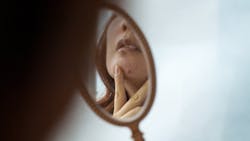Got skin breakouts from your mask? Advice for dental professionals
By the end of a workday, I’m more than ready to tear off my mask and personal protective equipment. As I walk out the door exhausted, nothing feels better than to breathe the fresh air and feel the breeze on my skin. But when I get home and look in the mirror, I hate to see a plethora of pimples on my face. Sometimes they’re clustered on my chin and other times they’re crowded around my nose. All I know is that I want to get rid of these unwanted visitors as soon as possible.
Since COVID-19 came into my life, this problem has only gotten worse. The pimples that used to be an issue every now and then have become a daily occurrence. Since wearing masks for at least eight hours a day is now the norm for many people, including those who work outside of the home and students who attend school in-person, acne that’s caused by mask wearing is a serious concern for millions of people.
When my 16-year-old daughter went back to school in August, she experienced breakouts almost immediately due to prolonged mask use. It started out as a rash on the right side of her nose and immediately began to spread. My daughter’s had issues with acne before, so she’s well-versed in what she needs to do to keep her face clean. It became a problem when her efforts were no longer successful. As a result, she panicked and was desperate for a solution. During her in-person school days, she could cover her breakouts with her mask. Unfortunately, during her e-learning days, her multiple zoom meetings have displayed her acne for all to see.
All these skin issues got me thinking, and I decided to take action to fight the acne battle. I refuse to accept this unappealing condition as my or anyone else’s new norm. I decided that wearing a mask did not have to doom me to bad skin, and I needed to learn as much as possible on this topic in order to help myself and others.
Why does wearing a mask cause breakouts?
When you wear a mask, your skin is in conditions that it’s normally not exposed to, and for a prolonged basis. Wearing a face mask is a source of friction, contact reactions, and epidermal barrier breakdowns that can lead to redness, pimples, and scaling.1 Allergic contact dermatitis can be caused by the chemicals used in mask manufacturing. Formaldehyde and bronopol are two of the chemicals found in polyproline surgical masks.2
The tissues of the face under the mask are also subject to hyperhydration, which means it is exposed to excessive amounts of moisture. Sweating, talking, and breathing lead to damp conditions that can cause problems.2 If a person already has skin conditions, a mask will exacerbate the issues.1
Numerous media sources have called this skin malady “maskne.” Acne mechanica is the medical term used for the skin conditions brought on by the protracted use of PPE.2 Mask wearing is a strong contributor to the problem, but protective eyewear, gloves, and face shields also play a role.1
A study conducted among 700 health-care workers in Hubei, China, in early 2020 showed that 97% of them experienced skin damage caused by the use of enhanced infection control measures.1,3 The nasal bridge was the most affected site at 83.1%, followed by the cheeks, forehead, and hands. The longer a health-care worker wore the PPE, the more likely their skin was negatively affected. People whose exposure was more than six hours per day had greater risk of skin damage than those who wore PPE for less time.1,3
How to fight the nasty “maskne”
Since you’re accustomed to wearing a mask on a regular basis, your patients, friends, and family members may ask you for advice about preventing facial breakouts. Do you know how to advise them? You might be wondering how to win the battle of the breakouts on your own face.
The American Academy of Dermatology has recommended steps to prevent these breakouts that take just a few minutes each day. The first is to wash your face daily with a gentle, fragrance-free cleanser. Normal soaps are too harsh to be used on the face.4 After that, apply a moisturizer, which creates a protective layer to reduce dryness. The brands that work best contain ceramides, hyaluronic acid, and dimethicone. The last ingredient is especially important for people with irritated skin because it creates a protective barrier. When choosing a moisturizer, look for one that is appropriate for your skin type, whether oily, normal/combination, or dry.
When it comes to breakouts, target the root cause. Cutibacterium acnes is the bacteria on the skin that produces pimples.5 Over-the-counter products that contain benzoyl peroxide, salicylic acid, glycolic acid, tea tree oil, and sulfur are known for their ability to fight breakouts. Applying a thin layer of vitamin A cream at night helps diminish existing pimples and prevent new breakouts.
Another helpful tip to reduce acne is not to wear makeup while wearing a mask as this can clog pores and increase the chance of breakouts.4 Most dental professionals are so covered up by their PPE that applying makeup really does not make much of a difference anymore. I suggest simply using it lightly around the eyes. If you choose to wear more makeup, a noncomedogenic formula is recommended because it is designed not to clog pores.
Mask tips
The next few tips involve the mask itself. Allison Truong, MD, a board-certified dermatologist with Cedars Sinai Medical Group, recommends washing cloth masks after they are worn in public for one day. The easiest way to do this is to have multiple masks that you can rotate using. Dr. Truong also recommends fragrance-free detergents because laundry detergents are another cause of allergic reactions on the face.6
The last tip involves proper fit of a mask, whether a cloth or surgical type. The rule of thumb is to have a snug but comfortable fit.4 This is achieved when the material closely hugs the nose, side of the face, and chin. If a mask is too loose, excessive friction from movement can contribute to skin irritation. If a mask is too tight and leaves indentation marks, the epidermal barrier may become compromised.4,6
Health-care workers do not simply need to accept skin breakouts as a normal consequence of our jobs. Our friends and family members should also not have to bear breakouts as an everyday consequence of wearing a mask. Taking care of ourselves is more important now than ever, and skin care is an essential part of that.
Because epidermal barrier disruption in conjunction with indirect skin contact has been proposed as a potential way of acquiring COVID-19, keeping skin intact may well be a crucial part of controlling the pandemic.1 Finally, the importance of feeling good about your appearance is a critical component of mental well-being that no one should have to deny themselves.
References
1. Darlenski R, Tsankov N. COVID-19 pandemic and the skin: What should dermatologists know? Clin Dermatol. March 24, 2020. doi: 10.1016/j.clindermatol.2020.03.012
2. Potts DJ. Suffering from breakouts under your mask? How to fight ‘maskne.’ Loma Linda University. August 17, 2020. https://news.llu.edu/health-wellness/suffering-from-breakouts-under-your-mask-how-fight-maskne
3. Lan J, Song Z, Miao X, et al. Skin damage among health-care workers managing coronavirus disease-2019. J Amer Acad Derm. March 11, 2020. doi: https://doi.org/10.1016/j.jaad.2020.03.014
4. 9 ways to prevent face mask skin problems. American Academy of Dermatology. https://www.aad.org/public/everyday-care/skin-care-secrets/face/prevent-face-mask-skin-problems
5. Geraghty LN. Face masks causing breakouts? A derm’s tip for ‘maskne.’ WebMD. June 2, 2020. https://blogs.webmd.com/healthy-skin/20200602/face-mask-causing-breakouts-a-derms-tips-for-maskne
6. Leibler S. Dermatologist says skip the ‘maskne,’ not the mask. Cedars Sinai. July 30, 2020. https://www.cedars-sinai.org/newsroom/dermatologist-says-skip-the-maskne-not-the-mask/
AMBER METRO-SANCHEZ, BA, RDH, practices dental hygiene with Chris Bible, DDS, at Comfort Dental in Fort Wayne, Indiana. She also works as a professional educator on behalf of Water Pik Inc. She is a contributing author for the Colgate Professional and Colgate Oral Care Center webpages. You may contact her at [email protected].
About the Author

Amber Metro-Sanchez, BA, RDH
Amber Metro-Sanchez, BA, RDH, practices dental hygiene with Chris Bible, DDS, at Comfort Dental in Fort Wayne, Indiana. She also works as a professional educator on behalf of Waterpik. Amber was a member of the 2015 Colgate Oral Health Advisory Board. She is also a contributing author for the Colgate Professional and Colgate Oral Care Center webpages. Reach her at [email protected].
